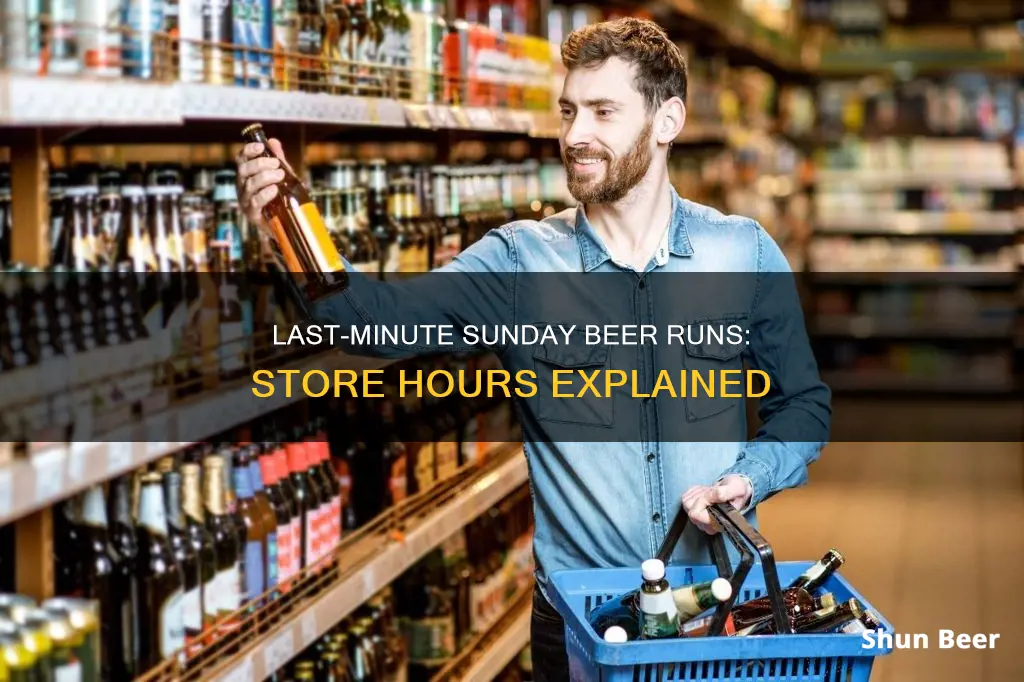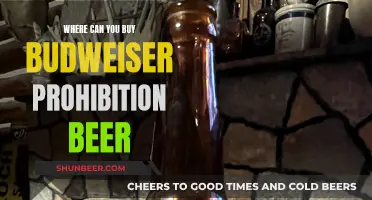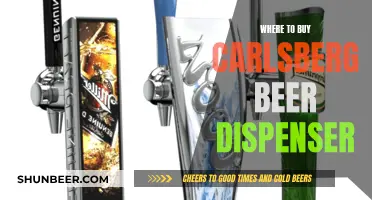
Alcohol sales laws vary across the United States, with some states and counties imposing stricter regulations than others. In Texas, for example, grocery and convenience stores can sell beer and wine from 7 a.m. to midnight on weekdays, 7 a.m. Saturday to 1 a.m. Sunday, and 10 a.m. to midnight on Sundays. Liquor stores are closed on Sundays and certain holidays. Arizona allows alcohol sales from 6 a.m. to 2 a.m. Monday through Saturday and 10 a.m. to 2 a.m. on Sundays. Ohio prohibits the sale of alcoholic beverages from 1 a.m. to 5:30 a.m. Monday through Saturday and 1 a.m. to midnight on Sundays.
| Characteristics | Values |
|---|---|
| State | Texas |
| Day | Sunday |
| Time | 10 am to midnight |
| Day before | Saturday |
| Time on the day before | 7 am to 1 am |
| Day after | Monday |
| Time on the day after | 7 am to midnight |
| Holiday | Thanksgiving, Christmas, New Year's Day |
| Holiday condition | If Christmas or New Year's Day falls on a Sunday, the store must remain closed on Monday |
What You'll Learn

Texas liquor laws
Texas has complex liquor laws, and the hours during which you can purchase alcohol vary by type and day of the week.
Beer and Wine
Beer and wine can be purchased from grocery and convenience stores between the hours of 7 a.m. and midnight, Monday through Friday. On Saturdays, sales are extended by an hour, ending at 1 a.m. on Sunday morning. On Sundays, sales begin at 10 a.m. and continue until midnight.
Bars and restaurants follow a similar schedule, but with some differences. On Sundays, they can serve alcohol from 10 a.m. to noon, but only if food is also ordered. If food is not included in the order, alcohol sales can begin at noon.
Liquor
Liquor stores are subject to stricter regulations and are only permitted to operate from 10 a.m. to 9 p.m., Monday through Saturday. They are closed on Sundays, Thanksgiving Day, Christmas Day, and New Year's Day. If Christmas or New Year's Day falls on a Sunday, the stores must remain closed on the following Monday.
Historical Context
The Texas blue laws, originally enacted in 1961, were designed to protect Sunday as a day of worship by limiting secular and commercial activities. While many of these laws have since been repealed, restrictions on alcohol and automobile sales remain.
Best Places to Buy Lone Star Beer
You may want to see also

Arizona liquor laws
Arizona's liquor laws have changed over the years. For example, in 2020, Gov. Doug Ducey allowed cocktails to-go for the first time when restaurants and bars closed down at the start of the COVID-19 pandemic.
In Arizona, you can buy alcohol between 6 am and 2 am every day of the year, including Sundays. This applies to bars, restaurants, and liquor, beer, and wine vendors. However, customers must stop drinking by 2:30 am, and bars and restaurants with liquor licenses must stop serving food at 10 pm.
Arizona's laws around alcohol and driving are strict. The maximum blood-alcohol content (BAC) allowable by law for drivers is 0.08 per cent. Over that limit, drivers are considered 'per se intoxicated' and can be convicted of driving under the influence (DUI). Under 'zero tolerance laws', operating a vehicle with any blood-alcohol content if the driver is under the age of 21 invokes DUI penalties.
Arizona used to have a 'blue law', which was a rule enforcing moral or religious standards on Sundays. This meant that alcohol sales started at 10 am on Sundays, as opposed to 6 am on other days. However, this law was overturned in 2010.
Tennessee's Early Beer Buying: Legal Hours and ID Requirements
You may want to see also

Illinois liquor laws
The state of Illinois is not a dry state, and alcoholic beverages can be sold and distributed. However, there are specific laws that govern the sale of alcohol in the state.
On-Premise and Off-Premise Hours
Illinois has on-premise and off-premise hours that vary depending on the day of the week and the city or village.
On Mondays to Thursdays, off-premise sales typically start at 6:00 or 7:00 a.m. and close between 10:00 p.m. and 1:00 a.m. On Fridays and Saturdays, off-premise sales may start earlier and close later in some parts of the state.
On Sundays, off-premise sales hours are from 8:00 a.m. to 2:00 a.m. for retailers like grocery and liquor stores. On-premise sales hours are from 11:00 a.m. to 2:00 a.m. for bars and restaurants.
Alcohol Delivery
Alcohol delivery is allowed every day within the specific off-premise hours, depending on the city or village.
Alcohol in Grocery Stores
Alcohol can be purchased at grocery stores from 6:00 a.m. to 11:00 a.m. However, the exact time may vary depending on the area. For example, in Grand Tower, alcohol sales start at 6:00 a.m. on Fridays, while in Hampshire, sales commence at 9:00 a.m. the same day.
Alcohol in Gas Stations
Gas stations that are licensed to sell alcohol can generally begin sales during the hours allowed by state law. The specific times may differ across locations, so it is recommended to check with the gas station or local ordinances for precise information.
Alcohol in 7/11 Stores
The alcohol sales hours for 7/11 stores in Illinois may vary depending on local ordinances and licensing regulations. It is best to check with a specific 7/11 location or the local alcohol control board for accurate information.
Alcohol in Bars and Restaurants
In bars and restaurants, alcohol can be purchased from 5:00 a.m. to 12:00 noon, Mondays to Saturdays, and from 12:00 noon onwards on Sundays. The closing time is typically between 8:00 p.m. and 2:00 a.m., with Fridays and Saturdays usually having extended hours.
Extended Hours
Businesses with a consumption or tavern license can apply for a Late Hour Liquor License to extend their operating hours beyond the standard closing time. With this license, establishments are permitted to remain open until 4:00 a.m. Monday through Saturday and 5:00 a.m. on Sunday.
Open Container Laws
Illinois has strict open container laws that prohibitsection=3-3-7>open containers of alcohol in vehicles, with certain exceptions for passengers in vehicles designed for the transportation of people for compensation, such as limousines and buses. Additionally, public drinking laws vary by municipality, and local ordinances dictate whether individuals can consume alcohol in public spaces.
Buying Beer Late on Saturday Nights: What's the Legal Limit?
You may want to see also

Georgia liquor laws
Georgia's liquor laws can be confusing as local jurisdictions are allowed to set their own more restrictive rules. However, here is a general overview of the state's liquor laws.
In Georgia, the days and time frames for alcohol sales are determined by individual counties, but they may not permit sales before 8 a.m. or after 11:45 p.m. from Monday through Saturday. On Sundays, alcohol sales are allowed from 12:30 p.m. to 11:30 p.m.
Where Can You Buy Alcohol in Georgia?
Georgia is not a dry state, but it does have dry counties where alcohol sales are restricted or prohibited. In counties that permit alcohol sales, you can buy beer, wine, and spirits at licensed retailers, including bars and restaurants, package and liquor stores, and breweries and taprooms.
Special Cases:
Some cities in Georgia have enacted a \"brunch bill\" that allows bars and restaurants to serve alcohol starting at 11 a.m. on Sundays. Additionally, during the COVID-19 pandemic, the state government made changes to allow restaurants to sell to-go cocktails and for retail stores to deliver beer, wine, and liquor to customers' homes.
Open Container Laws:
Georgia has an open container policy that allows individuals to stroll along in public areas with a drink in hand. However, there are strict regulations that prohibit the consumption of alcohol in motor vehicles. An open container is defined as any container with a broken seal or with some amount removed, and only the person consuming the alcohol will be charged with a violation, which carries a fine of up to $200.
Minimum Drinking Age:
The minimum drinking age in Georgia is 21, and it is illegal to sell alcohol to an underage person. There are a few exceptions to the minimum drinking age, including drinking with the permission of a parent or guardian in their presence, with a prescription from an authorized physician, or during a religious ceremony.
Buying Beer at Virginia Gas Stations: What's the Deal?
You may want to see also

Alabama liquor laws
Alabama's liquor laws are complex and vary depending on the location and type of alcohol. Here is a detailed overview of the Alabama liquor laws, specifically regarding buying beer on Sundays:
State-Run Liquor Stores
State-run liquor stores in Alabama, also known as ABC stores, are closed on Sundays. These stores are operated by the Alabama Alcoholic Beverage Control Board, which regulates the distribution, sales, and licensing of alcohol in the state.
Grocery Stores and Private Liquor Stores
Grocery stores and private liquor stores in Alabama are allowed to sell alcohol from 6 am to 2 am, seven days a week. This includes Sundays, but with some exceptions depending on the county.
County and City Regulations
Alabama has no completely dry counties, but the laws vary significantly from one county to another. There are 24 "moist" counties, which have wet cities within them where alcohol sales are permitted. The remaining 41 counties are completely wet.
Some counties and cities have specific regulations for Sunday sales. For example, in Birmingham, Huntsville, Mobile, and Auburn, on-site consumption sales are allowed starting at 10 am on Sundays. Tuscaloosa allows on-site consumption from noon to 10:30 pm on Sundays. Other cities, like Athens, Lee County, and Enterprise, have also approved Sunday alcohol sales.
Alcohol Content Restrictions
Alabama imposes restrictions on the alcohol content of beverages sold in the state. Beer sold in Alabama cannot exceed 6% ABV, and bottles cannot exceed 16 ounces. For wine, there is a 14.9% ABV limit.
Open Container Laws
Alabama has strict open container laws. It is illegal to have an open container of alcohol in the passenger area of a motor vehicle. Open containers must be kept in the trunk or similarly out of easy reach. There are some exceptions, such as in the living area of a motor home or a commercial vehicle meant for transporting passengers.
Minimum Drinking Age
The minimum legal drinking age in Alabama is 21 years old. There are no exceptions to this law, and it is illegal for parents or guardians to provide alcoholic beverages to minors.
In summary, while Alabama's liquor laws can vary by location and type of alcohol, generally, state-run liquor stores are closed on Sundays, grocery stores and private liquor stores can sell alcohol from 6 am to 2 am, and counties and cities have the authority to set their own regulations, especially regarding Sunday sales. Additionally, Alabama has specific restrictions on alcohol content and open container laws, and the minimum drinking age is 21.
Radegast Beer: Availability in the United States
You may want to see also
Frequently asked questions
In Texas, beer can be bought from 10 a.m. until midnight on Sundays.
In Ohio, beer can be sold from 5:30 a.m. on Sunday until midnight.
In Arizona, beer can be purchased from 6 a.m. to 2 a.m. on Sundays.
In Georgia, Sunday off-premise sales of beer are not allowed from 12:30 p.m. to 11:30 p.m.







